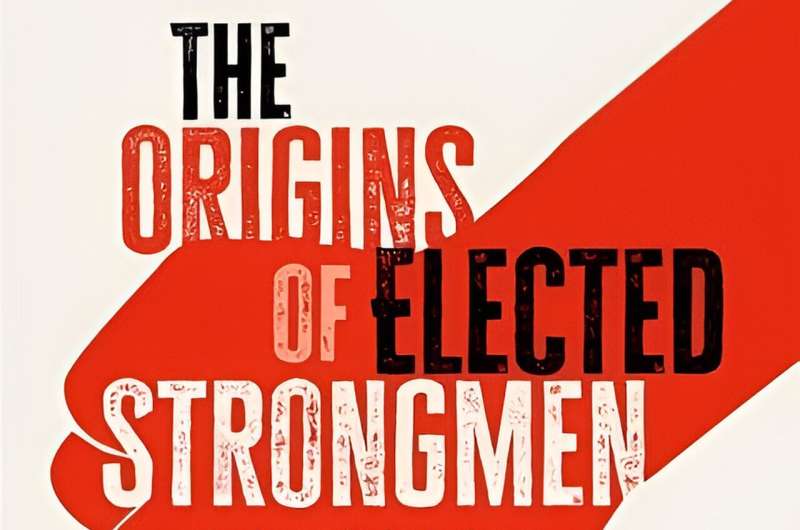
Joseph Wright’s interest in studying dictators and authoritarian leaders began during a concert at a Chilean military academy while he was studying abroad.
The head of the military academy at the time? The country’s former President Augusto Pinochet, who ruled the country as a dictator for more than a decade.
“We go there, watch her son play in the band, and then out trots the general and ex-dictator who was the head of the military academy at the time. And I got to meet him in person,” Wright said. “And that sparked my interest in dictatorships … living in Chile, which had just transitioned from having lived under a couple of decades of dictatorship and then meeting a man like that.”
Wright, a professor of political science at Penn State, is one of the authors of the new book, “The Origins of Elected Strongmen: How Personalist Parties Destroy Democracy from Within.”
The book’s co-authors are Erica Frantz, associate professor of political science at Michigan State University, and Andrea Kendall-Taylor, senior fellow and director of the Transatlantic Security Program at the Center for a New American Security and an adjunct professor at Georgetown University.
Wright recently appeared on the Democracy Works podcast, a collaboration between the McCourtney Institute for Democracy and WPSU. He talked with host Michael Berkman, McCourtney Institute director and professor of political science, about the book’s findings and how the research is informing his thinking about this year’s U.S. presidential election.
“The Origins of Elected Strongmen” will be released June 11 from Oxford University Press. Wright received a McCourtney Institute for Democracy Research in Democracy Support Grant in 2020 for a related project on technology and the personalization of politics. A condensed version Wright’s interview is below.
Q: What is the difference between an elected strongman and a dictator?
Wright: The dictator is somebody who comes to power in some way that’s not a fair and free election, with multiple parties running for the election. Elected strongmen are those who are coming to power for the first time in a fair and free election, but then subsequently decide to do things to undermine the government and the way democracy is run. And it could go all the way to the point where they undermine democracy so much that it collapses, or there’s no longer fair and free elections.
Q: Who are some examples of elected strongmen in history?
Wright: One contemporary example is Viktor Orban in Hungary. But the first ones to rise on the scene back in the 20th century, are folks like Ferdinand Marcos in the Philippines, Alberto Fujimori in Peru and Hugo Chavez in Venezuela.
Q: How do elected strongmen change political parties?
Wright: Traditionally, policy parties or programmatic parties may have an ideology or a set of policy proposals that elected officials, party leaders and voters share. Individuals gain power in that kind of party by working their way up the party system. For example, starting at the local level and going up to the state level up to the national level.
Elected strongmen are commonly associated with personal parties, where the leader controls the party and elites have less ability to constrain the behavior of the leader in the party. And the reason for that oftentimes, is simply because these are parties where the leader himself or herself, are more likely to have created the party as their own personal vehicle to get elected in the first place.
Q: How are elected strongmen and personal parties damaging to democracy
Wright: People like presidents or prime ministers have to rely on other people to help them do things. Even dictators don’t rule alone; there’s an organization that supports them, helps them gain power, and helps them stay in power. And in democracies, that support organization is the party. In personal parties, the leader has more individual power, and the elites in those parties are less likely to constrain the leader and the reason for that is twofold.
One is when the elite have less access to resources, they can’t use those resources to bargain with the leader of the party. If the leader has more nomination power, more financial resources, they are more likely to have a bargaining advantage when they’re trying to decide how they’re going to divvy up the power within the party. And the second is that the career incentives of the elites are often quite different.
For example, elites are better off not constraining the leader if the leader does something that would undermine democracy because their political careers are more closely tied to the leader rather than to the party brand itself and other elites in the party. What matters is your relationship with the leader of the party and how well you implement the program of the party at one level to get promoted up to the next level.
Citation:
Q&A: New book explores how elected strongmen weaken democracy (2024, May 21)
retrieved 21 May 2024
from https://phys.org/news/2024-05-qa-explores-elected-strongmen-weaken.html
This document is subject to copyright. Apart from any fair dealing for the purpose of private study or research, no
part may be reproduced without the written permission. The content is provided for information purposes only.







